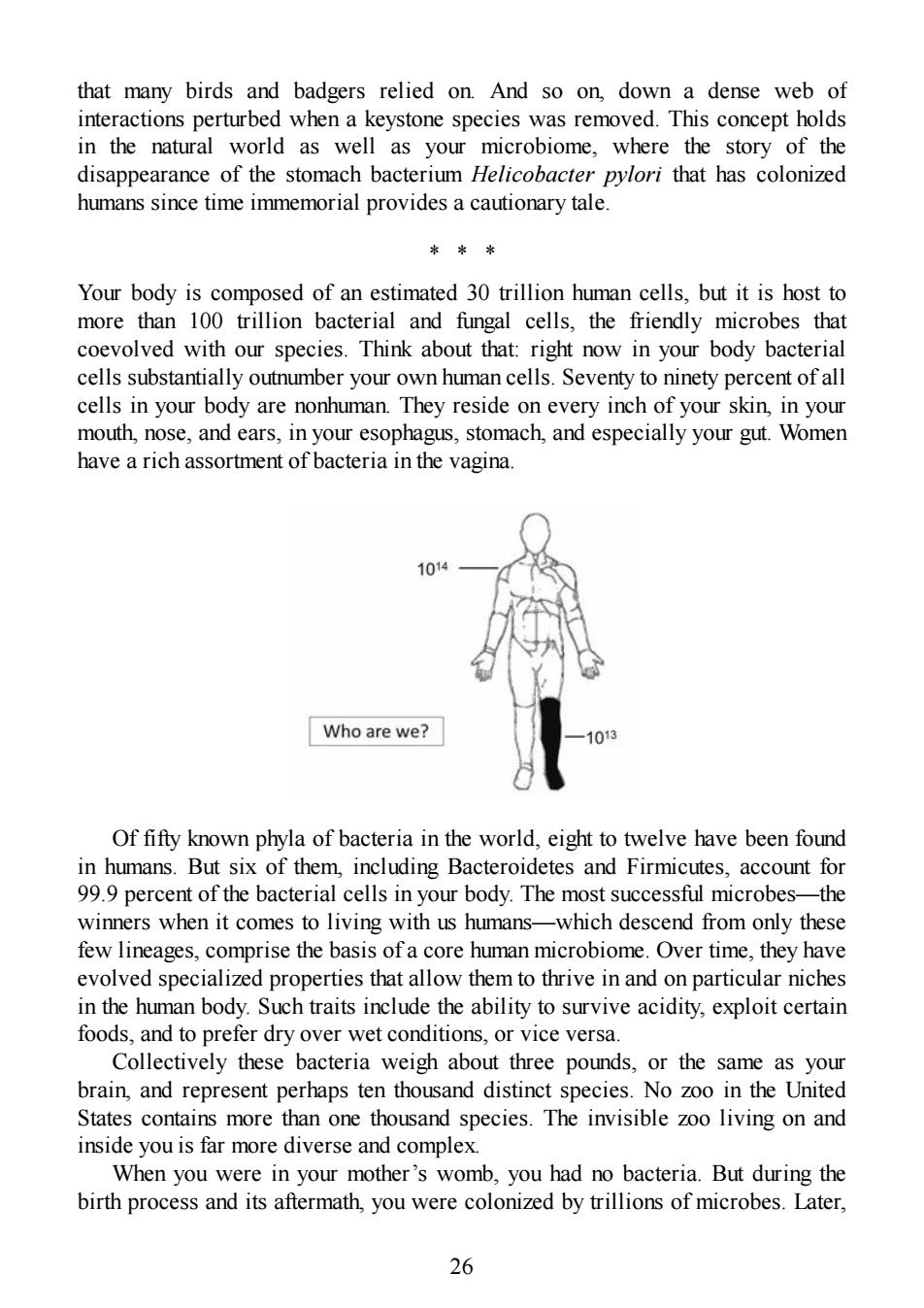正在加载图片...

that many birds and badgers relied on.And so on,down a dense web of interactions perturbed when a keystone species was removed.This concept holds in the natural world as well as your microbiome,where the story of the disappearance of the stomach bacterium Helicobacter pylori that has colonized humans since time immemorial provides a cautionary tale. Your body is composed of an estimated 30 trillion human cells,but it is host to more than 100 trillion bacterial and fungal cells,the friendly microbes that coevolved with our species.Think about that:right now in your body bacterial cells substantially outnumber your own human cells.Seventy to ninety percent of all cells in your body are nonhuman.They reside on every inch of your skin,in your mouth,nose,and ears,in your esophagus,stomach,and especially your gut.Women have a rich assortment of bacteria in the vagina. 1014 Who are we? 101 Of fifty known phyla of bacteria in the world,eight to twelve have been found in humans.But six of them,including Bacteroidetes and Firmicutes,account for 99.9 percent of the bacterial cells in your body.The most successful microbes-the winners when it comes to living with us humans-which descend from only these few lineages,comprise the basis ofa core human microbiome.Over time,they have evolved specialized properties that allow them to thrive in and on particular niches in the human body.Such traits include the ability to survive acidity,exploit certain foods,and to prefer dry over wet conditions,or vice versa. Collectively these bacteria weigh about three pounds,or the same as your brain,and represent perhaps ten thousand distinct species.No zoo in the United States contains more than one thousand species.The invisible zoo living on and inside you is far more diverse and complex. When you were in your mother's womb,you had no bacteria.But during the birth process and its aftermath,you were colonized by trillions of microbes.Later. 26that many birds and badgers relied on. And so on, down a dense web of interactions perturbed when a keystone species was removed. This concept holds in the natural world as well as your microbiome, where the story of the disappearance of the stomach bacterium Helicobacter pylori that has colonized humans since time immemorial provides a cautionary tale. * * * Your body is composed of an estimated 30 trillion human cells, but it is host to more than 100 trillion bacterial and fungal cells, the friendly microbes that coevolved with our species. Think about that: right now in your body bacterial cells substantially outnumber your own human cells. Seventy to ninety percent of all cells in your body are nonhuman. They reside on every inch of your skin, in your mouth, nose, and ears, in your esophagus, stomach, and especially your gut. Women have a rich assortment of bacteria in the vagina. Of fifty known phyla of bacteria in the world, eight to twelve have been found in humans. But six of them, including Bacteroidetes and Firmicutes, account for 99.9 percent of the bacterial cells in your body. The most successful microbes—the winners when it comes to living with us humans—which descend from only these few lineages, comprise the basis of a core human microbiome. Over time, they have evolved specialized properties that allow them to thrive in and on particular niches in the human body. Such traits include the ability to survive acidity, exploit certain foods, and to prefer dry over wet conditions, or vice versa. Collectively these bacteria weigh about three pounds, or the same as your brain, and represent perhaps ten thousand distinct species. No zoo in the United States contains more than one thousand species. The invisible zoo living on and inside you is far more diverse and complex. When you were in your mother’s womb, you had no bacteria. But during the birth process and its aftermath, you were colonized by trillions of microbes. Later, 26